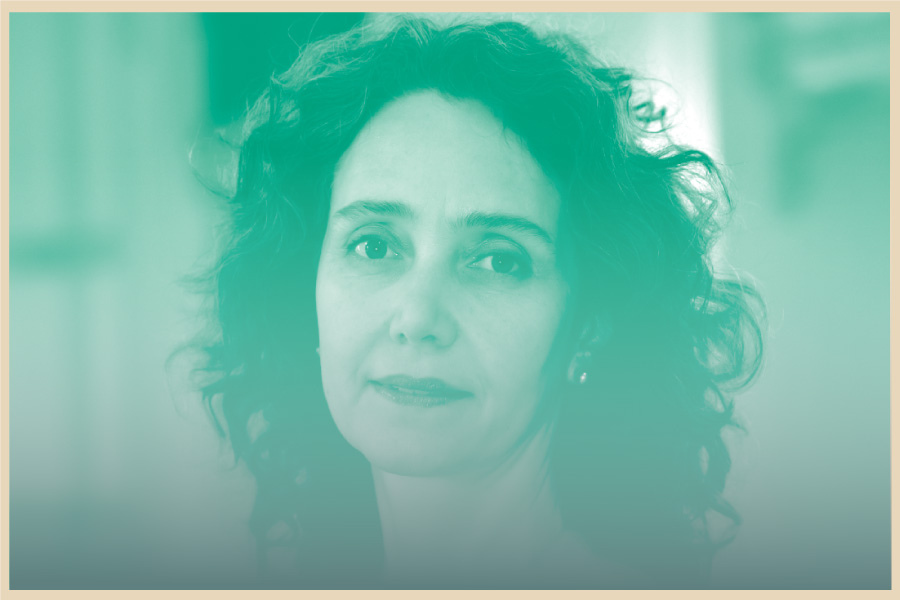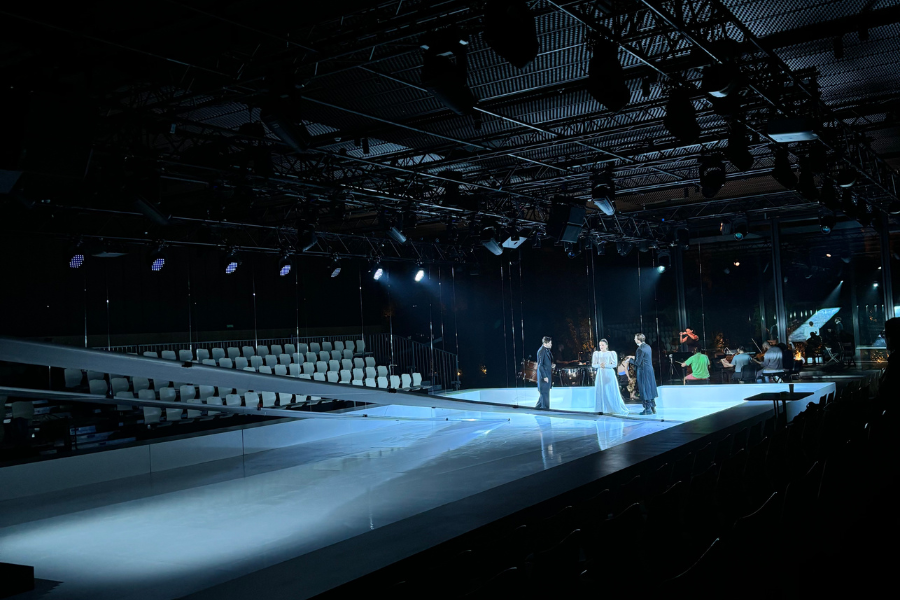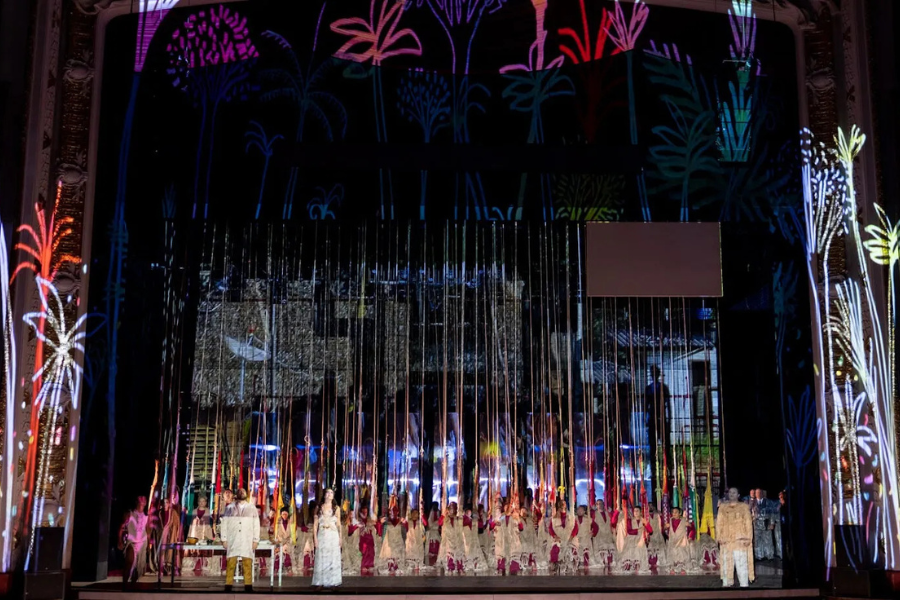Andrea Caruso, director of the TMSP: “With ‘Opera outside the box’ we have the possibility of expanding the language of opera”

During this 2022, the Theatro Municipal de São Paulo (TMSP) has promoted a new artistic and programming project. This is Opera out of the box (“Ópera fora da caixa”), which consists of presenting opera productions outside the conventional space of the stage, bringing audiences closer to new places in the theater and finding new possibilities for a work to circulate.
Until now, the Municipal de São Paulo has premiered the operas Acteón (Charpentier) and Domitila (Ripper) within the framework of this initiative.
In this interview, the director of the São Paulo Municipal Theater, Andrea Caruso, delves into the details of the gestation of Ópera outside the box, explains who participates in the project, how the programmatic decisions are made and, in addition, advances the new frontiers that this format for programming opera makes possible in today’s world.
“In a theater you always have to encourage the renewal of its artistic languages to accompany time, life, people. Opening spaces, in general, is perhaps one of the great focuses that we can never lose, so that ideas are oxygenated, for the good encounter to happen”, Andrea points out.
- What does the Opera out of the box? Why, for what purpose did you decide to promote it? How is this initiative inserted in the general artistic project of the theatre?
The Opera Outside the Box consists of presenting opera productions outside the stage box of the theatre, promoting the expansion of the genre in chronological and spatial terms. The goal is to present works to the public that would not be presented on the big stage and to create more viable circulation possibilities for the work.
- Who participates in the project? Who directs the operas, the artistic production and who makes up the cast? Do stable bodies participate, for example?
Another very important point is to open spaces for experimentation and encourage new artists. In this way, we can invite creators from other fields who want to experience the language of opera, young creators or the most experienced, who precisely because they already have mastery of larger productions, want new challenges. The casts are made up of both the artistic bodies of the theater and guest artists.
“Bringing opera to other spaces has an extra interest in the format”
- The execution of the project began with the baroque opera Acteón and soon it will be the turn of Domitila, an opera composed in Brazil with a plot linked to the country’s history. Why did you decide to start with these titles? What criteria have you considered to program “Opera outside the box”?
In 2021 we will also launch a public call for artists who want to develop their projects at the Municipal Theater of Sao Paulo. This call was very interesting because we received projects from various places and languages, which ended up being part of our programming at different times and situations.
A baroque music group came up with a production project for this edition and a member of our curatorial committee proposed that they change the title to Actéon. Therefore, we talked to those who made the proposal and we came up with a project that made sense both for the general program of the theater and for this baroque music group and we integrated our Lyric Choir into the production.
Domitila, composed from the reading of Domitila’s letters to her lover D. Pedro II, was an external project that came to us for the programming linked to the ephemeris of the 200th anniversary of the arrival of the Portuguese court in Brazil. We also received, through the edict, a proposal for the creation of a new work that we include as a commission for a new opera, in a small format, in the final phase of creation at this time. Thus, we continue our purpose of promoting new creations, while expanding the projects presented outside the main stage.
Therefore, the criteria for choosing the works are varied. As we collectively shape the programming, with the valuable contribution of an interdisciplinary curatorial committee composed, among others, of the artistic directors of the bodies and the theater programming team, we end up exchanging a lot with each other and taking the opportunity to include, in more alternative projects, some aspects that are not contemplated in the classical opera season.
- What artistic value does staging opera bring to other theater spaces? How do you decide in which spaces of the theater to stage an opera “out of the box”? What challenges has it implied for the theater production teams?
We usually use the other spaces of the theater for programs such as recitals, exhibitions, evenings, concerts, meetings, plays, performances, dance… Lastly, we are in the habit of exploring all possibilities, both internal and external, as well as having with a room focused on chamber programming, the Conservatory Room, where the String Quartet performs periodically.
But the opera had not been brought to these spaces and this seemed to us an important space to fill. Bringing opera to other spaces has an extra interest in the format. The biggest challenge is always the technical one, since acoustics is always an issue and we also have restrictions regarding the use of lighting and the fixing of pieces on the walls. But this is not bad, on the contrary, it is the challenges that make artists develop unusual ideas and projects to be taken to unexpected spaces.
- What effect has this new opera production format had on audiences? Do you think that opera becomes more accessible without the formalities of a traditional stage? How does the change of format influence the connection of the public with the theater as a cultural organization?
The public received the proposal very well, we had sold out tickets in all the presentations and an enthusiastic return. In the case of Actéon, the audience was divided into two sides, with the show taking place in the middle, as in a large hall. The public was very close to the artists and that made us discover new sensations, in addition to having had the privilege of crossing our eyes and sharing the reactions with the public that was in front of us, also forming, in a certain way, part of the scene. .
As a cultural organization, I believe in the importance of promoting not only the encounter of the public with the works, but also with each other. The new configurations spark new conversations and exchanges between everyone, contributing to the power of artistic enjoyment.
- Do you think that the programming of operas in this format can facilitate the expansion of the repertoire offered by the theater? Why?
Certainly, because it expands the possibilities of presenting more titles, betting on unusual formats and enjoying different periods and styles.
- Today we discuss how to carry out opera productions in a sustainable and sustainable way, especially in the context of a world in crisis. Do you think that this project is an opportunity to go in the direction of more sustainable and sustainable productions?
Sustainability in opera productions is part of our overall goal in the theater. We have a great challenge and a lot to do to get where we want, but without a doubt projects like “Opera outside the box” were more daring in the searches and rehearsals. Thus, the idea of recycling materials, the alternative use of energy, etc., end up being driving forces for artistic and productive proposals.
“Opening spaces, in general, is perhaps one of the great focuses that we can never lose”
- After this experience, what challenges and opportunities does innovation in the ways of producing opera offer?
If we stop looking for innovation, we lose the greatest meaning of our work. In a theater you always have to encourage the renewal of its artistic languages to accompany time, life, people. Opening spaces, in general, is perhaps one of the great focuses that we can never lose, so that ideas are oxygenated, so that the good meeting happens. In short, to question ourselves and prevent ideas from becoming conceited. In a public theater with five hundred employees, made up of six artistic bodies, guarded by a long tradition, this is a great challenge.
- Opera out of the box is a new project of the TMSP. What future do you see for this initiative? Will more titles be programmed in other theater spaces? Have you thought about “taking out the box” these shows to other unconventional spaces outside the theater? Do you expect you can export it to other Brazilian theaters or to other countries? Are there plans to “take out of the box” other shows offered by the theater?
We have many plans and we hope to implement them as soon as possible. An important idea for us is to make these opera productions circulate in places other than the theater. The obstacles are always the costs, but we have tried to establish associations with other institutions so that the circulation takes place.
We have developed an interesting project in the theater, ‘Municipal Circula’, which consists of making an exchange between the most peripheral regions of the city of São Paulo and the center, where we are located. We take the Artistic Corps not only to present their shows, but also to give workshops and exchange with artists from different regions.
Every time we invite local artists to accompany the program and promote the arrival of people from the regions we pass through to come and participate in the theater programs. We haven’t taken any opera out of the box yet to circulate in this project, but it’s in our plans to do so!
We believe that the productions have the potential to circulate in other countries, other cities and states, because they are much simpler proposals than a grand opera and offer creative staging. Finally, I believe that we have a beautiful possibility of expanding the language of opera to unconventional spaces and being able to promote this action is a great opportunity for any theater that is involved in this idea.





